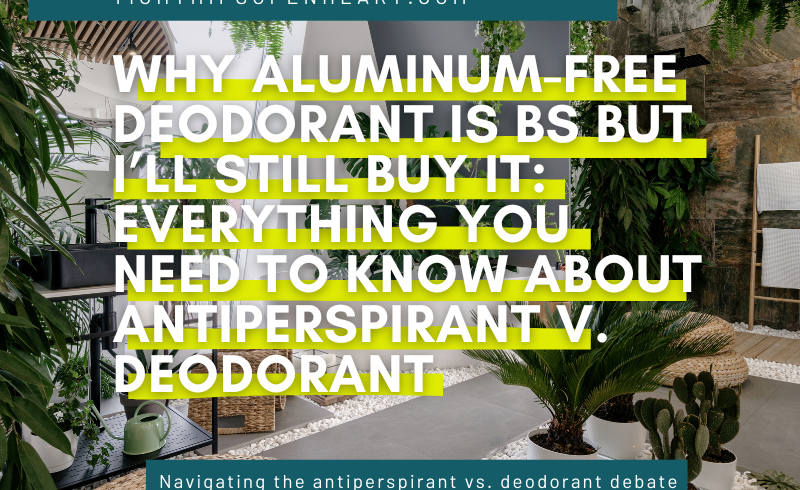
There’s a lot of things I thought I would know by my late 20’s; how to do my taxes, how many oz are in a cup, the difference between antiperspirant and deodorant. While the first few will forever be foreign to me, a Google search and a surprisingly helpful Teen Vogue article helped me realize the two terms aren’t interchangeable. Oops.
Deodorant v. Antiperspirant: Why is it important to know the difference?
Once you know the difference between deodorant and antiperspirant you can start to understand the benefit each product plays and why the phrase “aluminum-free deodorant” frankly shouldn’t mean anything to you.
“Deodorant” is a product used to cover up (‘de-odor’) sweat produced from the skin’s apocrine glands (think: armpits and groin area). Fun fact: sweat itself doesn’t actually smell. The stink from sweat is produced when bacteria ferments and breaks down the proteins in sweat. Different brands may use various fragrances or essential oils to mask the sweat smells, but some can also utilize alcohol bases to sterilize bacteria and create an environment this bacteria can’t survive in.
TL;DR – if you use deodorant, your body will still produce sweat in response to temperature regulation, sweat, spicy foods, etc. but that sweat shouldn’t smell.
On the other hand, the goal of antiperspirant is to prevent sweating all together. More on that below.
Why is aluminum in deodorant?
There’s a lot of buzz about “aluminum-free” beauty products, specifically in the deodorant/antiperspirant world. Why is aluminum in our underarm products anyway? When aluminum salts interact with our sweat, they undergo a chemical reaction to form a physical plug in the sweat duct, effectively blocking the release of perspiration onto the skin’s surface.
Aluminum is currently the only FDA-approved active ingredient to slow down sweating, though I’d be surprised if there wasn’t research to prove there are other natural ingredients, void of heavy metals, that work to stop sweating just as well.
Why is aluminum in deodorant “bad?”
With a number of breast cancer cases starting towards the underarm near where deodorant is applied, the understandable conclusion was that the aluminum in antiperspirants was sneaking in to the skin through nicks and cuts from shaving and leaking into the lymph nodes. And though many of the myths around aluminum in our beauty products causing breast cancer and Alzheimers have been debunked, including from the American Cancer Society, it never hurts to make swaps for cleaner ingredients.
So if aluminum is only used to prevent sweat from leaving the body and the goal of deodorant is only to cover up the aroma, wouldn’t all deodorants be aluminum-free? It’s kind of like saying, “vegan water,” sounds like it should be healthier but it’s also already naturally part of the product.
Deodorant
Deodorize the dew
- Uses fragrances to help cover the smell of sweat.
- Will NEVER contain aluminum.
- Use if you want to prioritize letting your body function as intended (Ex: you’re working out, it’s a cool day, etc.)
Antiperspirant
Stop the sweat
- Blocks your sweat glands from pushing out sweat.
- Will ALWAYS contain aluminum.
- Use if you want to prioritize staying dry (Ex: work, date night, wearing a nice top you don’t want to sweat through)
To be clear, I’m not speaking in defense of aluminum. I fully support removing unnecessary ingredients in our self-care products, especially those that stop our bodies from doing exactly what they were built to do. My issue lies with beauty companies praying on emotionally-charged words like “aluminum-free” on products that naturally fall under that category. Instead, they could spend that time educating consumers on the differences between products like antiperspirants and deodorants to make more empowered decisions.
It’s not to say I’ll never purchase an “aluminum-free deodorant” again. I’m more concerned with the ingredients going in and on my body than the marketing used to sell the products to me. I would prefer to support brands that deliver more straight-forward messaging, and I think you would too.

When should I use deodorant vs. antiperspirant?
There’s benefits of keeping both a deodorant and an antiperspirant in your beauty routine and once you know what deodorant and antiperspirants do, you can start to make a more educated decision about when you want to use each.
If you’re headed to work, date night or another nice occasion where you know you don’t want to sweat through your outfit, swipe on an antiperspirant. When you’re on your way to a tough workout class and then out to brunch afterwards, you may actually want to let your body sweat it out to help cool you down – and release some extra toxins. So reach for your (naturally aluminum-free) deodorant to keep you feeling fresh.
In the end, the choice between antiperspirants and deodorants boils down to personal preference. If you prioritize sweat reduction above all else, traditional antiperspirants might be your best bet. But if you’re willing to sacrifice a little dryness for the sake of your health, aluminum-free deodorants could be the way to go. So, go ahead, make an informed decision, and don’t let the marketing hype sway you. Your underarms will thank you for it.
Have you tried any natural deodorants? What are some of your favorites? Do you include both deodorant and anti-perspirants in your beauty routines?

Thanks for stopping by.
Stick around to stay up to date with the practical health and wellness for the consciously busy woman.









